Filipinas, women from the Philippines, are known for their unique blend of beauty and strength. They are admired for their resilience, their nurturing spirit, and their commitment to family and community. But how well do we truly understand the depth and diversity of these remarkable Filipino women? Let’s embark on a journey to explore the essence of Filipina beauty and strength, the cultural tapestry of Filipino womanhood, and the global impact of trailblazing Filipina leaders.
Key Takeaways
- Filipina women are renowned for their strength, resilience and unyielding spirit.
- Traditional values such as respect, commitment and family shape Filipina lives while inspiring trailblazing leadership in politics, business and more.
- Organizations like BRIDGE program support the rights of migrant workers while advocating gender equality through initiatives such as CEDAW.
The Essence of Filipina Beauty and Strength
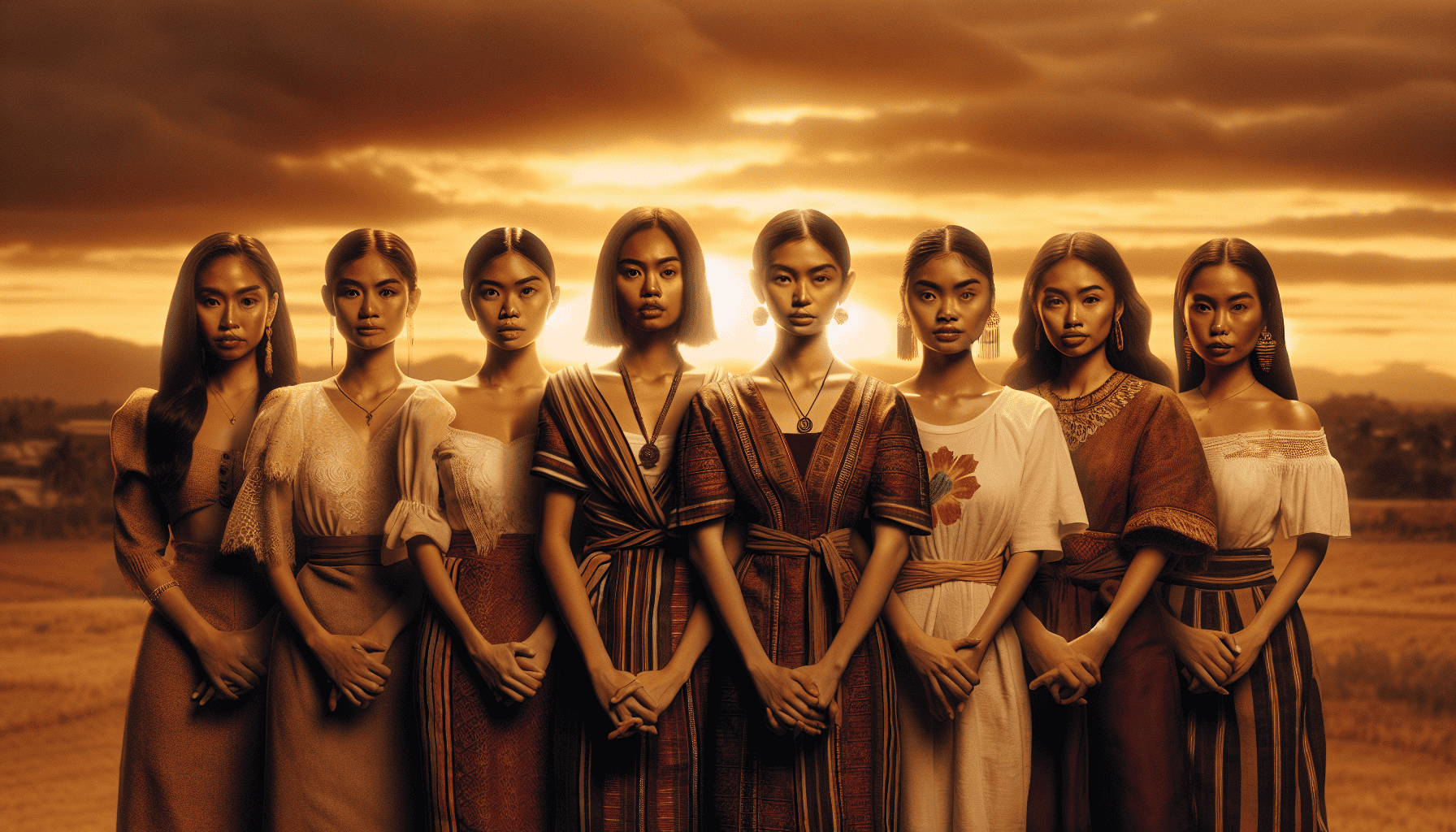
The allure of a Filipina extends beyond their physical attributes. Indeed, their black hair, brown eyes, and radiant smiles are enchanting, yet it’s their inner beauty that distinguishes them. Filipina women are known for their kind hearts, their resilience in the face of adversity, and their unwavering commitment to their families and communities. These qualities, deeply ingrained in the Filipino culture, make Filipinas not just physically attractive but also emotionally and spiritually appealing.
The average height of Filipinas is between 5 feet 0 inches (152 cm) and 5 feet 4 inches (162 cm), and they weigh approximately 120 lbs (54 kg). But they stand tall in their strength and determination. Take the example of Ms. Romulo, the owner of Romulo Café in Manila. She broke barriers in the international business scene and continues to inspire many with her success.
The combination of strength and beauty makes Filipinas a truly formidable presence.
Defining Filipina Beauty: Beyond Black Hair and Brown Eyes
Undeniably, Filipina women possess physical allure. Their high cheekbones and clearly defined jawline set them apart from their Asian neighbors and other races. Their naturally black hair and complexion, ranging from light to dark brown, are reminiscent of the rich and diverse culture of the Philippines. And yet, the radiant beauty of Filipina women goes far beyond their physical attributes.
Filipina women are known for their excellent cooking skills and their achievements extend beyond the kitchen. Their ability to nurture and take care of their families, their resilience in the face of adversity, and their strength to break barriers and make their mark in various fields are what make them truly beautiful. For example, Corazon Aquino became the first female president of the Philippines, breaking barriers and paving the way for equal opportunities in politics.
The Unyielding Spirit of Filipino Women
The tenacity and spirit of Filipino women serve as a source of inspiration. They have the capacity to surmount difficulty and embolden others, as exemplified by the achievements of female presidents like Corazon Aquino and other prominent leaders in various fields. Their strength and resilience are deeply ingrained in the Filipino culture, which emphasizes perseverance, determination, and faith in the face of difficulties.
Take, for instance, the story of Hidilyn Diaz, a Filipina from Zamboanga City. Despite facing various difficulties, she pursued her passion for powerlifting and emerged victorious, becoming a source of motivation for women of all ages. Filipina women like Diaz demonstrate that with hard work, determination, and an unyielding spirit, they can rise above adversity and inspire others to do the same.
Nurturing the Next Generation: Filipino Women as Educators and Role Models
Filipino women hold a significant role in influencing the thoughts and values of the upcoming generation, including girls. As educators, they impart knowledge and values. As role models, they inspire young people to aspire for greatness and make a positive impact in their communities.
Notable Filipina women such as:
- Maria Ressa
- Miriam Defensor Santiago
- Lea Salonga
- Ayn Bernos
- Tessie Sy-Coson
have made significant contributions in their respective fields and have become exemplary figures for the younger generation in the Philippines. Programs like FEMtorMatchTM are also in place to cultivate the next generation of Filipina leaders through local and global partnerships between female mentors and mentees.
The Cultural Tapestry of Filipino Womanhood
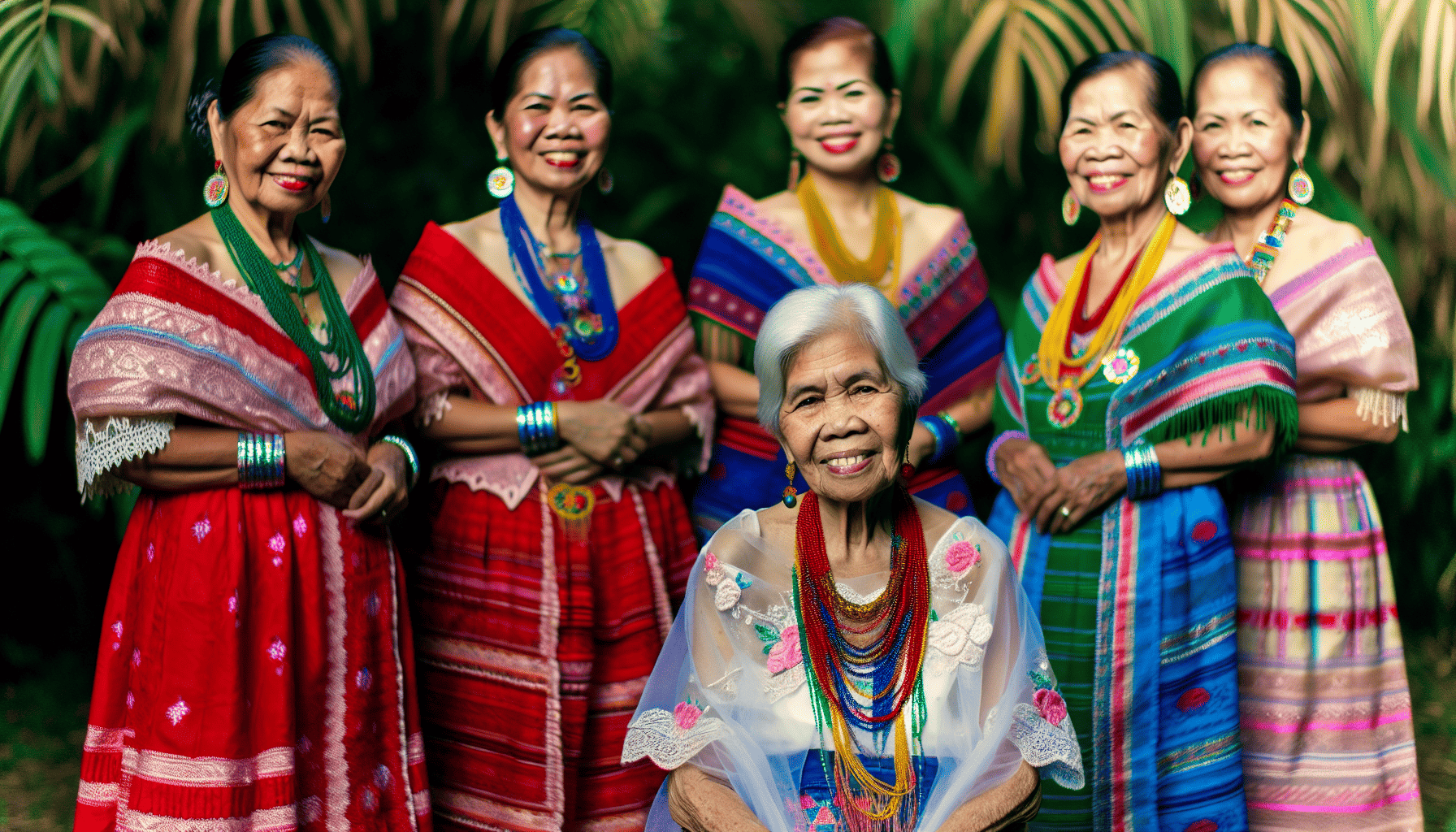
The rich mosaic of Filipino womanhood is intertwined with cultural, traditional, and religious threads. Historical relationships with colonizers, cultural norms and expectations, and the roles of women in the home and family are some of the primary cultural influences that shape Filipino womanhood.
Traditional Filipino customs such as strong family dynamics and household structures, along with the influence of Catholicism, have a considerable impact on the lives and roles of Filipina women. Despite the challenges posed by these customs and roles, Filipina women continue to rise above and make significant strides in various fields.
Gender Roles and Equality in Filipino Culture
In the traditional Filipino culture, men are perceived as the primary breadwinners and providers, while women are generally expected to assume a more domestic role, taking care of the home, children, and elderly relatives. However, these gender roles have evolved over time, with women beginning to take on more traditional roles during the Spanish colonization.
Despite some individuals opining that men are more suitable for political leadership, a considerable percentage of people demonstrate confidence in female leaders. Nonetheless, Filipino women remain largely underrepresented in the top echelons of both governmental and corporate spheres.
As cultural norms progress, advocating for gender equality and equal opportunities across all fields remains paramount.
Celebrating Traditions: How Local Customs Shape the Lives of Filipina Women
Traditional Filipino customs and practices greatly influence the lives of Filipina women. These customs provide women with opportunities to engage in various roles such as organizing events, preparing traditional food, and showcasing their talents. Moreover, these traditions serve as a platform for women to connect with their communities, strengthen social bonds, and pass down cultural knowledge to future generations.
Customs such as designating specific days for celebrations and having suitors demonstrate their interest by sending gifts and going on supervised dates are widely practiced in the Filipino dating scene. These customs not only reflect the rich culture of the Philippines but also reinforce the importance of respect, commitment, and family values in relationships.
The Influence of Religion on Filipino Society and Family Life
Religion, especially Catholicism, holds a significant influence over Filipino society and familial life. It reinforces traditional values such as respect for elders and family, faithfulness, and humility. Attendance at mass, participation in religious festivities, and celebration of religious holidays are essential components of Filipino social and family life.
The influence of Catholicism on Filipino society extends to the values and customs of Filipino families. It champions strong family bonds, respect for the elderly, and the sanctity of matrimony. These religious teachings nurture a culture of love, respect, and unity among Filipinos, making them a closely-knit community that values family and relationships above all else.
Trailblazing Filipina Leaders and Their Global Impact
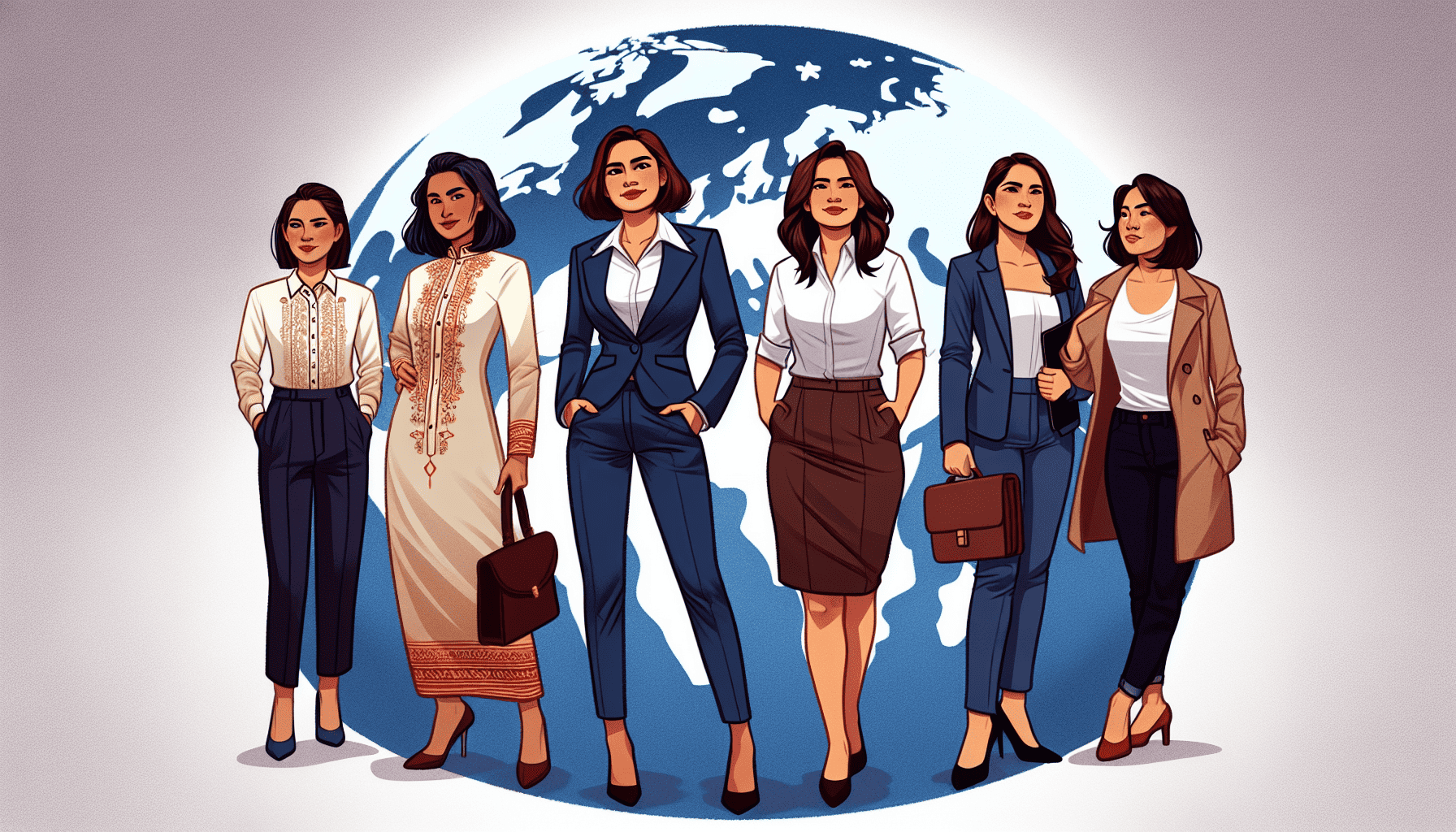
Filipina women are recognized not only for their beauty and strength, but also for their leadership capabilities and their influence on a global scale. From politics to business, they have left an indelible mark in various fields, inspiring others with their success and accomplishments. These trailblazers have demonstrated that with hard work, determination, and an unyielding spirit, Filipina women can rise above challenges and make significant contributions at the global stage.
From the first female president, Corazon Aquino, to successful entrepreneurs like Vicki Belo, Mica Tan, and Angeline Tham, Filipina women have shown that they have the skills, knowledge, and passion to lead and innovate. In doing so, they have not only driven economic growth and innovation but also paved the way for future generations of Filipina leaders.
From the Lower House to the Presidency: Filipina Women in Politics
Filipina women have made substantial advancements in political leadership, overcoming obstacles and setting a path for future generations. Corazon Aquino, the first female president of the Philippines, is a testament to the leadership potential of Filipina women. Her presidency marked a significant milestone in the political landscape of the Philippines, proving that Filipina women are capable of leading the nation and making significant policy changes.
Filipina politicians have implemented significant policies such as the Framework Plan for Women, which promotes women’s economic empowerment and protects their rights. They have also worked towards fulfilling the obligations of the Philippines as a signatory to the Convention on the Elimination of All Forms of Discrimination Against Women (CEDAW). Their efforts have resulted in improvements in the status of Filipino women and increased female political representation in the country.
Filipina Entrepreneurs: Creating Economic Opportunities and Innovations
Filipina entrepreneurs hold a substantial role in stimulating economic growth and fostering innovation in the Philippines. According to the Department of Trade and Industry (DTI), as of 2018, 64% of small- and medium-scale industries were either owned or led by women. These women are not just creating jobs and contributing to the economy, but they are also introducing innovative businesses and practices that are changing the landscape of the country’s business sector.
Take for example, Socorro Ramos of National Book Store and Tony Tan Caktiong of Jollibee. These women established their businesses from the ground up and achieved great success. They have shown that with hard work, determination, and innovative thinking, Filipina entrepreneurs can create economic opportunities and make a significant impact on the country’s economy.
Advocates for Change: Filipina Women Fighting for Gender Equality and Protection
Filipina advocates have been at the forefront of championing gender equality and protection for women. These women, through their advocacy work, have initiated significant changes in the Philippines, advocating for accelerated infrastructure development, preserving equitable growth, and augmenting women’s political engagement.
Through their efforts, these advocates have also implemented significant alterations in the Philippines, including the advancement of social and behavioral transformation in the human rights field via initiatives like I-ACT. They have also contributed to the Philippine Revolution, which revealed the deficiencies of Spanish colonial rule.
Moreover, their advocacy has had an impact on deliberations on migration and development in the nation.
The Dynamics of Dating and Marriage Among Filipinos

In the Philippines, customs related to dating and marriage center around:
- Courtship, commitment, and partnership
- The practice of Panliligaw or courting, wherein potential couples meet within a social group
- The practice of harana or serenading, wherein individuals serenade the person they admire with love songs
These customs reflect the Filipino culture’s emphasis on respect, commitment, and familial approval.
The role of the family in Filipino courtship cannot be overstated. The family’s approval and acceptance are indispensable in the courtship process. Men may also perform household chores to show respect to the woman’s family, in a practice known as paninilbihan. These traditions not only reflect the rich culture of the Philippines but also reinforce the importance of respect, commitment, and family values in relationships.
Courtship and Commitment: Understanding Filipino Dating Customs
In Filipino dating customs, courtship and commitment are seen as vital expressions of love and dedication towards the other individual. Courtship is also perceived as a way to obtain the approval of the family and to guarantee that the relationship is founded on mutual respect and understanding.
Courtship in Filipino culture typically involves several stages, starting with the teasing stage conducted by friends. This is followed by the stage of panliligaw or courtship, which is considered the most romantic and sweetest stage. During this stage, the man expresses his intentions and actively pursues the woman. Men and women play traditionally defined roles in this process, with men taking the initiative and women expected to be open to the man’s advances.
The Ideal Partnership: What Makes Filipina Women Attractive Life Partners?
A Filipino woman, like many Filipina women, is acknowledged for her qualities that render her an appealing life partner. They are known for their:
- Loyalty
- Support
- Nurturing nature
- Passion
- Strong family values
- Respect
- Attractiveness
- Optimism
- Humor
- Positivity
These qualities make them good partners in a relationship and contribute to a successful marriage.
In the Philippines, Filipina women are held in high regard for their roles as wives and mothers. It is expected that they prioritize these roles over all other aspects of their lives, as this perception is deeply embedded in the country’s conservative culture. These qualities, combined with their unwavering commitment to their families and communities, make Filipina women ideal life partners.
Cross-Cultural Relationships: Insights for Those Dating Filipina Women
Recognizing and respecting cultural differences is pivotal in cross-cultural relationships with a Filipina woman. The unique customs and traditions that define the Filipino dating culture, such as family approval and traditional values, should be respected and understood.
It is commonly misconceived that relationships with Filipina women are based solely on financial transactions or that Filipina women are promiscuous due to the issue of trafficking. However, the majority of Filipina women are devoted and affectionate in relationships. Cross-cultural relationships with Filipina women can be truly enriching and fulfilling if cultural differences are appreciated and respected.
Addressing Challenges: Protecting the Rights and Welfare of Filipina Women
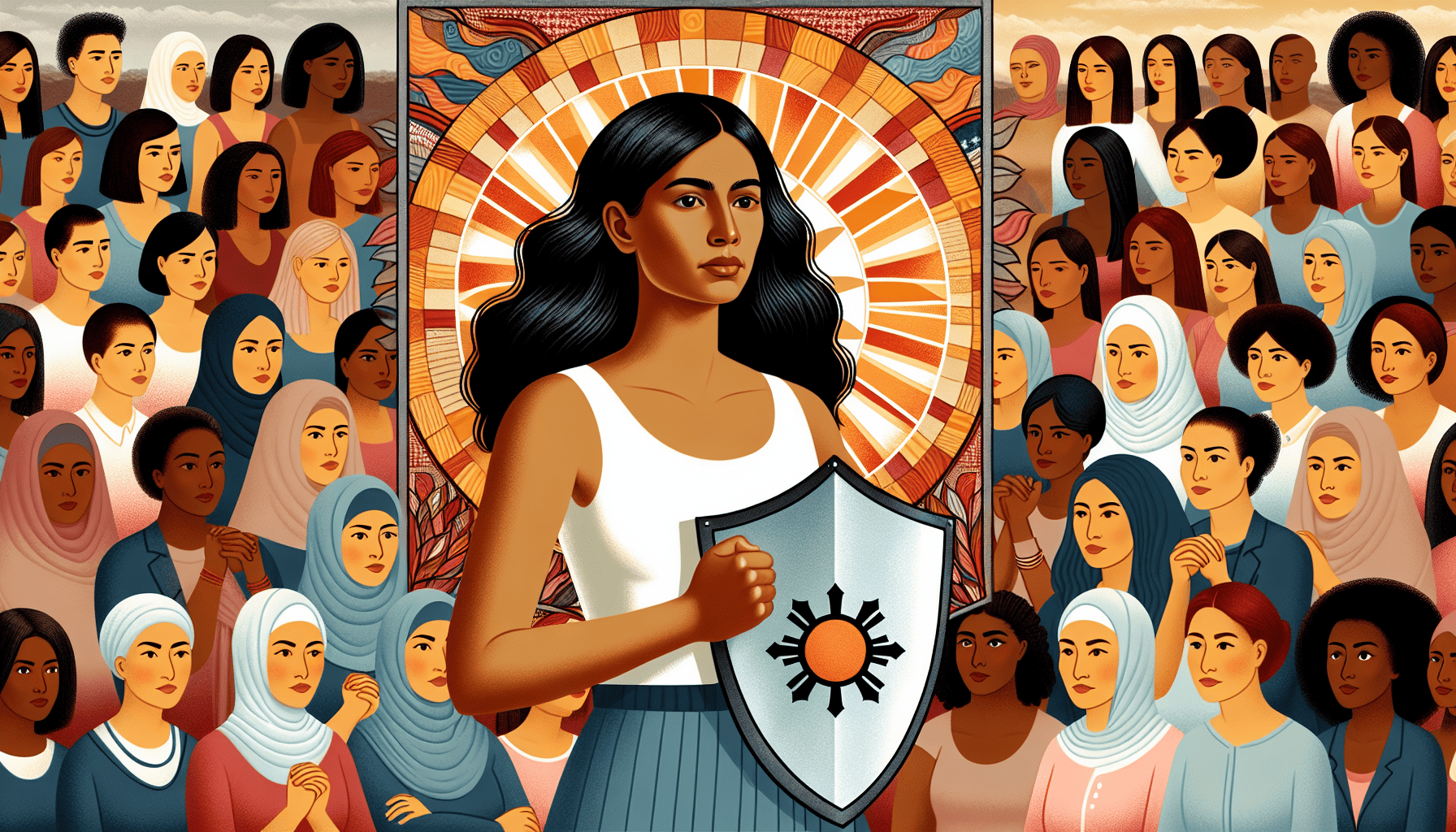
Like their global counterparts, Filipina women encounter numerous challenges. These range from societal pressures and gender discrimination to problems related to overseas employment. The Philippine government has taken several measures to safeguard the rights of Filipina women. Notably, Republic Act No. 9710, more commonly known as the Magna Carta of Women, has been enacted. This extensive law seeks to eradicate discrimination against women and promote their rights and welfare.
Beyond legislative actions, a variety of organizations and initiatives are dedicated to safeguarding and empowering Filipina women. These groups provide support, resources, and services to Filipina women, raising awareness about their issues and advocating for policy changes. Together, these efforts are instrumental in addressing the challenges faced by Filipina women and in protecting their rights and welfare.
Combating Domestic Violence: Support Systems and Services for Filipina Victims
Domestic violence is a grave concern impacting numerous Filipina women. The Republic Act No. 9262 is commonly referred to as the “Anti-Violence Against Women and Their Children Act of 2004”. This act sets penalties for offenses against women. The government also provides a range of services to domestic violence victims, such as:
- hotline support
- reporting mechanisms
- shelters and assistance
- counseling and advocacy.
Community organizations play a critical role in the fight against domestic violence. They provide victims of domestic violence with support, resources, and services, while also raising awareness about the issue and advocating for policy changes. Together, these efforts are instrumental in combating domestic violence and in providing the necessary support and services to Filipina victims.
Empowering Migrant Filipina Workers: Safeguarding Their Rights and Dignity
Numerous Filipina women pursue overseas employment in other countries in the quest for improved opportunities. However, they often face difficulties such as:
- nostalgia
- family matters
- cultural disparities and language hindrances, including the challenge to speak English
- financial matters
- the apprehension of falling
The International Convention on the Protection of the Rights of All Migrant Workers and Members of Their Families is in place to ensure the protection of the rights and dignity of Filipina migrant workers.
Organizations like the BRIDGE program and the Transnational Union of Filipino Migrant, Domestic, and Care Workers are dedicated to protecting the rights and dignity of migrant Filipina workers. They provide support, resources, and services to Filipina women working overseas, and advocate for policy changes to safeguard their rights and dignity.
Building a Foundation for Gender Equality: Education and Career Opportunities for Filipina Women
The Philippines has made impressive strides towards gender equality, ranking 16th among 146 countries in the Global Gender Gap Index. Women in the Philippines have access to educational opportunities, and there are several initiatives aimed at empowering them through education and capacity building exercises.
Despite these strides, there is still much work to be done to further promote gender equality and to ensure that Filipina women have equal access to education and career opportunities.
Summary
In conclusion, Filipina women, with their unique blend of beauty and strength, their resilience, and their dedication to their families and communities, are truly a force to be reckoned with. Despite the challenges they face, they continue to shine in various fields, from politics and business to advocacy and education. They are not only trailblazers making significant contributions at the global stage but also nurturing figures shaping the minds and hearts of the next generation. Let us continue to celebrate the essence of Filipina beauty and strength, and let us continue to protect their rights and welfare.
Frequently Asked Questions
What is a female Filipino called?
A female Filipino is referred to as a Filipina.
What are Filipina known for?
Filipinas are widely known for their hospitality, charm, hard work and family-orientated values.
Are Filipinas loyal?
Filipinas typically stay loyal to their partners and keep faithful despite the lack of reciprocity, thanks to strong family values.
What is the role of females in the Philippines according to Filipino culture?
In Filipino culture, women are seen as powerful and influential, with many occupying important roles in family life, business, government, and farming.
What are the traditional dating customs in the Philippines?
The traditional dating customs in the Philippines involve Panliligaw or courting, and Harana or serenading. Both practices are aimed at getting potential couples to meet within a social group and expressing admiration through love songs.
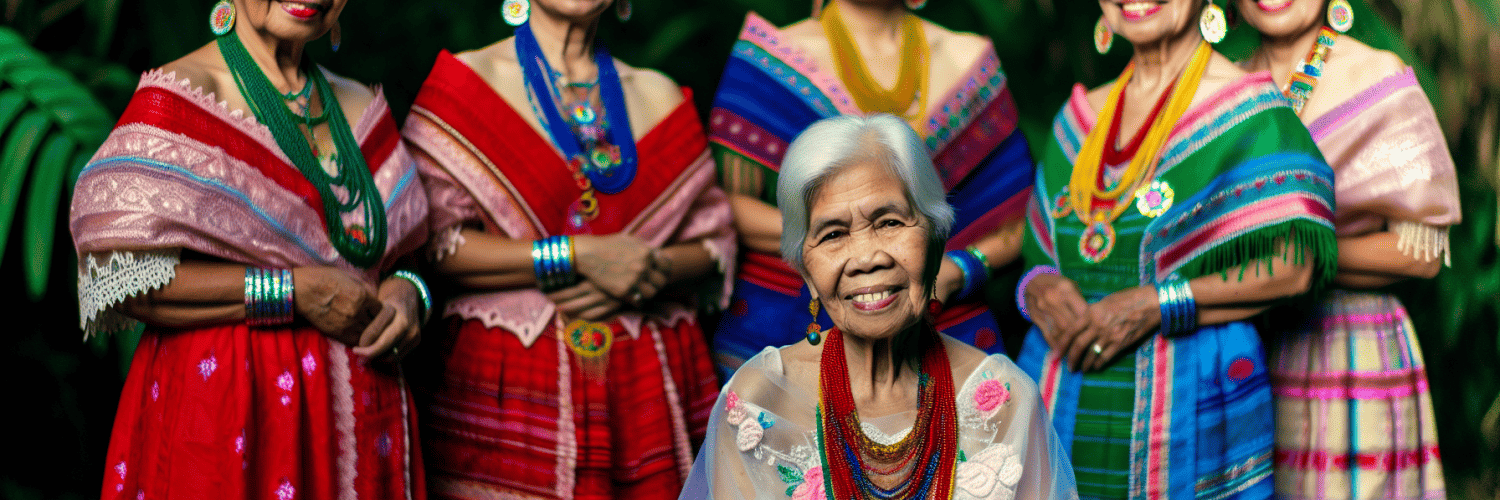






Add comment